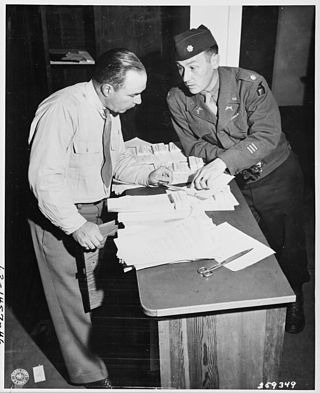Other uses
- United States–Mexico–Canada Agreement, a free trade agreement
USMC are the initials for the United States Marine Corps.
USMC may also refer to:

The North American Free Trade Agreement was an agreement signed by Canada, Mexico, and the United States that created a trilateral trade bloc in North America. The agreement came into force on January 1, 1994, and superseded the 1988 Canada–United States Free Trade Agreement between the United States and Canada. The NAFTA trade bloc formed one of the largest trade blocs in the world by gross domestic product.
CA or ca may refer to:

The Mariana and Palau Islands campaign, also known as Operation Forager, was an offensive launched by United States forces against Imperial Japanese forces in the Mariana Islands and Palau in the Pacific Ocean between June and November 1944 during the Pacific War. The United States offensive, under the overall command of Chester W. Nimitz, followed the Gilbert and Marshall Islands campaign and was intended to neutralize Japanese bases in the central Pacific, support the Allied drive to retake the Philippines, and provide bases for a strategic bombing campaign against Japan.

The Iran hostage crisis was a diplomatic standoff between Iran and the United States. Fifty-two American diplomats and citizens were held hostage after a group of militarized Iranian college students belonging to the Muslim Student Followers of the Imam's Line, who supported the Iranian Revolution, took over the U.S. Embassy in Tehran and took them as hostages. The hostages were held for 444 days, from November 4, 1979 to their release on January 20, 1981. The crisis is considered a pivotal episode in the history of Iran–United States relations.
GTC may refer to:
CFA may refer to:
MSA or M.S.A. may refer to:

Provost marshal is a title given to a person in charge of a group of Military Police (MP). The title originated with an older term for MPs, provosts, from the Old French prévost. While a provost marshal is now usually a senior commissioned officer, they may be a person of any rank who commands any number of MPs; historically, the title was sometimes applied to civilian officials, especially under conditions of martial law, or when a military force had day-to-day responsibility for some or all aspects of civilian law enforcement. A provost marshal may also oversee security services, imprisonment, fire/emergency services and ambulances.

The Naval Academy Preparatory School or NAPS is the preparatory school for the United States Naval Academy (USNA). NAPS is located on Naval Station Newport, Rhode Island. The mission of the Naval Academy Preparatory School is "To enhance Midshipman Candidates' moral, mental, and physical foundations to prepare them for success at the United States Naval Academy".
John or Jack Kelly may refer to:

Joint Terminal Attack Controller (JTAC) is the term used in the United States Armed Forces and some other military forces for a qualified service member who directs the action of military aircraft engaged in close air support and other offensive air operations from a forward position. The term that is used in most other countries, as well as previously in the U.S. and in the relevant NATO standard, is Forward Air Controller. The term became effective in the U.S. on September 3, 2003 with the publishing of Joint Publication (JP) 3-09.3 Close Air Support.
Hispanics in the United States Naval Academy account for the largest minority group in the institution. According to the academy, the Class of 2009 includes 271 (22.2%) minority midshipmen. Out of these 271 midshipmen, 115 are of Hispanic heritage. In 2004, of the total of 736 female midshipmen, 74 (10%) of them were of Hispanic descent.
Jack Miller may refer to:

The assistant commandant of the Marine Corps (ACMC) is the second highest-ranking officer in the United States Marine Corps, and serves as a deputy for the commandant of the Marine Corps (CMC). Before 1946, the title was known as the assistant to the commandant.
SS William R. Cox may refer to one of three American Liberty ships named in honor of Civil War General William Ruffin Cox:

William Alfred Eddy, Ph.D., Col., USMC was a U.S. minister to Saudi Arabia (1944–1946); university professor and college president (1936–1942); U.S. Marine Corps officer, serving in World War I and World War II; and U.S. intelligence officer.
Dartmouth may refer to:
Great Lakes Treaty may refer to:

The Type L6 ship is a United States Maritime Administration (MARAD) designation for World War II as a Great Lakes dry break bulk cargo ship. The L-Type Great Lakes Dry Bulk Cargo Ships were built in 1943 to carry much-needed iron ore from the upper Great Lakes to the steel and iron production facilities on Lakes Erie and Ontario in support of the war effort. The ships have a 15,675 tonne deadweight tonnage. The L6 ships were built by two companies: American Ship Building Company, in the case of the type L6-S-A1 models, of which 6 were built; and Great Lakes Engineering Works, Ashtabula, Ohio/ Great Lakes Engineering Works, River Rouge, Michigan, in the case of the type L6-S-B1, which produced 10 ships. Steel supply needed for World War was great. To supply iron ore from Lake Superior to steel foundries, the United States Commission had a series of L6 Lakers ship built. The Maritime Commission ordered ten Great Lakes Bulk Carriers of the L6-S-B1 type. The L6-S-B1 was design with a 3-cylinder triple expansion steam engines. The L6-S-A1 used a lentz 4-cylinder compound engine. All L6 ships were coal burning and delivered between May and November 1943. L6-S-B1 was built for the US Maritime Commission under USMC contract MCc-1834 in 1943 at the River Rouge yard. Each L6 ship cost $2.265 million. The first L6-S-B1 was the SS Adirondack/Richard J. Reiss, hull 290, keel was laid on March 9, 1942 and launched on September 19, 1942. The ships are often called the Class Lake Bulk Freighter now.